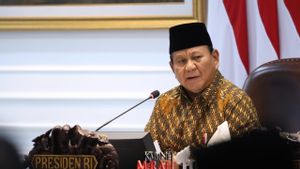JAKARTA - Executive Director of the Pratama-Kreston Tax Research Institute (TRI) Prianto Budi Saptono said that the implementation of taxes on e-cigarettes in 2024 was based on the Law (UU).
"Every tax for state needs must be based on the law. As stated in Article 23A of the 1945 Constitution. Cigarette taxes have been designated as one of the regional taxes in Law No.1/2022 concerning Financial Relations between the Central Government and the Regional Government (UU HKPD)," he explained to VOI, Thursday 4 November.
Prianto said that the HKPD Law has regulated that cigarette taxes are collected by the provincial government.
The object is in the form of cigarette consumption which includes cigarettes, cigars, leaf cigarettes, and other forms of cigarettes that are subject to cigarette excise.
According to Prianto, this was done because e-cigarettes were subject to excise duty, so that they were automatically subject to cigarette taxes.
As for the implementation of the HKPD Law, the government has issued the Minister of Finance 143/2023 which is valid from January 1, 2024.
Prianto added that the electronic cigarette tax was not part of state revenue in the state budget but to the provincial budget.
"Because cigarette taxes go to the Provincial Budget, automatically cigarette tax receipts, including objects in the form of e-cigarettes, do not enter the APBN," he said.
Prianto said that the Ministry of Finance enforces excise tax, while the cigarette tax by the provincial government and both are forms of tax that can have a minimum of two functions.
The first function is to increase government revenue so that the government can redistribute the tax in the form of government spending.
The second function is earmarking, which is that tax revenue is used to deal with the negative impact (externality) of cigarette consumption.
SEE ALSO:
Prianto emphasized that the government can increase excise rates on tobacco products and cigarette taxes to overcome the health impacts of cigarette consumption.
"Simplely speaking, the price for the purchase of cigarettes that must be borne by consumers is increasing. Thus, it is hoped that public consumption of cigarettes will decrease or be more controlled," he concluded.
The English, Chinese, Japanese, Arabic, and French versions are automatically generated by the AI. So there may still be inaccuracies in translating, please always see Indonesian as our main language. (system supported by DigitalSiber.id)














